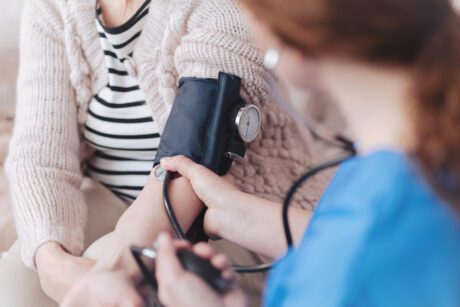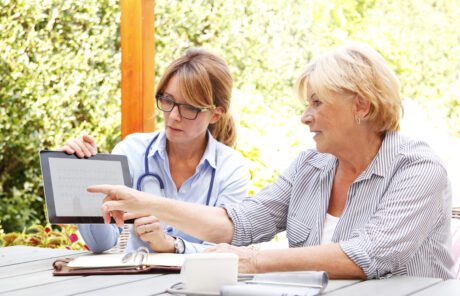No products in the basket.
Understanding the Safe Handling of Medication in Health & Social Care
It is essential that everyone who is involved in the care sector understands the safe handling of medicines. This Level 2 Safe Handling of Medication in Health and Social Care course covers the basics of how to handle medication safely and efficiently in health and social care settings. By the end of the course, you will be able to understand the objectives of safe handling of medicines, know how to store and use medication safely, and understand guidelines for safe disposal of unused/expired medication. If you’re concerned about the safe handling of medicines in your work or home environment, this course is for you!

Overview of the safe handling of medicines
It’s vital that staff members in health & social care are properly trained in the safe handling of medicines. This includes understanding how to check the medication inventory monthly, and documenting any changes. In addition, all staff members need to undergo safety training in order to understand how to handle medication safely. Medication should always be handled with care, and all medication should be stored in a safe place. Finally, it’s important to know where drugs are kept onsite, in order to ensure they’re safe and accessible at all times.
The main objectives of the course
Medication safety is of paramount importance when handling medication in health and social care settings. This Level 2 Safe Handling of Medication in Health and Social Care course is designed to equip health care professionals. Also, this course provide them essential knowledge and skills needed to safely handle medication, while raising awareness of the importance of safety. The objectives of the course are: to improve clinical practice by ensuring that staff have a sound understanding of safe medication management; to support effective safeguarding against potential harm from incorrect or malicious use or disposal of medicines. This course is mandatory for all staff who works with Medication (HACCP) in Health & Social Care settings in England. The key topics covered include: safe storage, handling, transport, administration and disposal of medication.

How long is the course?
Health and social care professionals are responsible for the safe handling of medication. This course provides you with the knowledge and skills to handle medication safely and protect the health of patients. The Level 2 Safe Handling of Medication in Health and Social Care course covers the basics of medication handling. The 3-hours 30 minutes course includes lectures and quizzes. The materials are available online so you can access them at any time when needed. So what are you waiting for? Register now and get started on learning the safe handling of medication!
Why is it important to understand the safe handling of medicines?
It’s no secret that medication can be dangerous if mishandled. This is especially the case in health and social care settings, where patients are often unable to take care of themselves. Poor handling of medication can result in accidental overdoses, incorrect dosing, and even injuries to patients or healthcare workers. That’s why it’s so important to have proper training when it comes to the safe handling of medicines. This training can be provided by healthcare professionals, but is also important for patients and their families. In order to protect both patients and healthcare workers, it is essential to know the different types of medication. Once you have a basic understanding of how these medications are safe to handle, it’s time to start practicing safe handling of medication in the real world.
Safe handling of medications in health & social care
It is everyone’s responsibility to ensure that medications are handled safely and correctly. This is of particular importance in the health and social care sector, where incorrect handling of medication can have serious consequences for patients and staff. Safe handling practices include keeping medication in the original container, keeping it out of the reach of children, and ensuring that it is handled in a safe, clean, and dry environment. By following these simple guidelines, everyone working with medication will be safer and help to minimise the risk of medication errors.
Safe handling of medications – the basics
When it comes to safe handling of medication, it is essential to know the basics. This includes understanding what each drug is and how it works. It is also important to keep medications in their original packaging and out of reach of children or pets. If you experience any side effects from taking a medication, do not drive or operate heavy machinery until the effects have worn off. Finally, never share medications with others – this can lead to adverse consequences for both you and them. By following these simple safety tips, you can keep yourself and those around you safe when handling medication.
Safeguarding patients and staff during medication administration
Medication administration can be a confusing and dangerous task for health and social care staff. To make the process safe and effective, remember the following tips: – Use injection pens only for administration of liquid medications. – Always use appropriate safety equipment when handling medication, including gloves and a face shield. – For solid medications, break them into smaller pieces before administering to avoid potential choking hazards. – Monitor patients for side effects and seek medical help if necessary.
The hazards associated with medication administration
Medication is a critical part of health and social care, and it’s essential that it’s handled safely. There are many hazards associated with medication administration, so it’s important to know how to safely handle them. In this level 2 module, we’ll be discussing the different ways medication is administered, as well as the hazards associated with each. We’ll also be discussing safe handling of medication, including the right way to store and protect them. By the end of this module, you’ll be better equipped to handle medication safely in health and social care.
The importance of medication safety
Medication safety is of paramount importance in health and social care settings. This is why automatic drug scanners are so beneficial. By identifying potential dangers, these scanners can help to ensure the safe administration of medication. Additionally, the safe handling of medication depends on the correct storage, handling, and disposal of medications. This is why it is crucial that all staff is properly instructed on these safe practices. Ensuring safe medication administration is the key to keeping everyone safe.
Safe storage and use of medications
Safe handling of medication is of utmost importance. Not only does it protect the patient, but also the health and safety of staff and other patients. As a health and social care professional, it’s your responsibility to know and follow the safe storage and use of medications. Medications should be stored according to the manufacturer’s guidelines, and if you experience an adverse reaction, seek emergency medical help immediately. It’s also important not to share medications with others, especially if they’re not qualified to handle them. Keep medications out of the reach of children and pets, and away from extreme temperatures. In addition, make sure to keep medication cabinets and storage areas safe and organized to make it easy to find what you’re looking for.
What are the essential elements of safe handling of medications?
It is essential to safe handling of medications that everyone understands the essential elements of safe handling. In this blog post, we will outline the safe handling of medications in health and social care settings. First and foremost, always dispose of expired or unused medications in a safe way according to local guidelines. This includes properly destroying medication in a safe and controlled manner. Secondly, keep medication out of the reach of children, pets, and other possible users. Remember to keep all medication records up-to-date so you can track usage and adverse effects over time. Safe handling of medications starts with taking the time to understand their contents and how they should be used. By following these essential steps, everyone can help protect the safety of patients and staff alike. Additionally, if need more information, you can visit nationwidechildrens.org.
Guidelines for safe disposal of unused/expired medication
There are a lot of safe and secure ways to dispose of medication that is no longer needed or approved due to safety concerns. This includes understanding which medications are no longer needed or approved due to safety concerns and then disposing of them in a safe and secure manner. Pharmacists can help patients understand which medications are no longer needed or approved due to safety concerns, and provide safe disposal guidelines for these medications. When disposing of medications that have been unused for the time prescribed by the medication label, only dispose of them in a safe and secure manner. Safe disposal of medication includes throwing them away in the garbage, recycling them. By following these safe disposal guidelines, everyone – patients, pharmacists, and the general public – can benefit from safe and secure medication disposal.
Reporting any suspected adverse drug reactions (ADRs)
It’s important to be aware of the safe handling of medication in health and social care settings. By understanding the basics of ADRs, you can help protect both you and the patients you care for. Always speak up and ask questions if you have any concerns about medication. If you experience an ADR, report it to your health or social care professional as soon as possible. By doing so, you can help ensure that patients receive the best possible care. By reporting any suspected ADRs promptly, you can help build a positive safety record and maintain the trust of patients and staff.
Frequently Asked Questions
-
How should I store my medication so that it is safe to take it when I have to drink?
When it comes to storing medication, the most important thing is to make sure it is safe to take when you have to drink. One way to do this is to keep track of who took the medication and when. This way, you can prevent any accidental poisoning from happening. Additionally, announce to everyone who will be taking the medication with you where and when the medication is being drunk. Another way to make sure that your medications are safe to take is to store them in a tightly sealed container. If someone else needs to take your medication, make sure they understand how it should be taken and what side effects may occur if it is not taken as prescribed.
-
What are the different levels of safety that must be met when handling medication?
There are three levels of safety that must be met when handling medication. The preventive level is the most important as it helps to ensure that medication is not accidental ingested or released into the environment. The protective level ensures that medication is stored and transported safely so it doesn’t get damaged or lost. Finally, the reactionary level ensures that if something does go wrong during medication handling, then appropriate action will be taken immediately.

-
What are some common mistakes made when administering medication?
When it comes to administering medication, there are a few common mistakes that are often made. Here are some of the most common:
-
- Forgetting to give the correct dose of medication.
- Giving the wrong drug or incorrect combination of drugs.
- Not following patient’s instructions correctly.
- Administering medications without properly assessing their condition.
- Double checking that you have given the right medicine to the right person can mean the difference between life and death for them.
-
How can I reduce the risk of accidental exposure to medications?
When it comes to reducing the risk of accidental exposure to medications, always follow the dosage instructions carefully. The safest place to store medications is in a locked cabinet or safe. Never leave medications out where children or pets can reach them. Take extra precautions when handling tablets and capsules: wear gloves, wash your hands thoroughly, and avoid contact with eyes, noses, and mouths.
-
How can I avoid making any accidental injuries while handling medications?
One of the most important ways to avoid any accidental injuries while handling medication is to make sure that they are stored in a safe place and that they are not easily accessed by others. For example, keep them away from children and pets, store them in their original containers, and never leave them around where they can be easily reached. If you are unsure about how to safely handle a particular medication, then ask your pharmacist or doctor for tips. In addition, always wear gloves when handling medications. Gloves protect your hands from contact with potentially harmful ingredients of the medication. Not wearing gloves can also lead to skin irritation or other allergic reactions.
-
What should I do if I find a misplaced medication?
If you find a misplaced medication, the first thing you should do is call your pharmacist. They will be able to check the medication’s barcode to see where it may have been sold and then contact the patient or their family member who may have lost it. If contacting either of these parties fails, then you can try to track down the medication by looking for its barcode and checking with pharmacists in different areas or hospitals around the country.
-
What are the basic principles of medication safety?
Some of the basic principles of medication safety include the following:
-
- Always take the entire dosage at once – even if it means swallowing it whole. This way, you reduce the risk of any accidental overdose.
- Store medications in a cool, dry place where children cannot reach them. By keeping medication safe and out of the reach of children, you can avoid any potential health complications.
- Never mix different types of medication together – this could cause serious health complications. Mixing different types of medication can result in interactions that can disturb the dosage and even increase the risk for side effects.
- Keep all medication away from heat and moisture, as both can damage them. Heat and moisture can also release harmful chemicals that can affect the potency of medications.
-
How do I safely dispose of unused or expired medications?
One safe way of disposing of medications is by throwing them away in the garbage. You can also securely store unused or expired medications in a designated container for future disposal. Many pharmacies offer collection services for unused and expired medicines, which helps protect the environment.
-
What are the types of medication that should always be stored in a safe place?
When it comes to storing medication safely, always consult your doctor or pharmacist first. They will be able to tell you the safe ways of storing medication and what precautions to take to keep it safe from leakage. Medication should be stored in a cool, dry, and safe place away from children and pets. It is never advisable to mix medication with other chemicals, or expose it to direct sunlight or heat.
Conclusion
The safe handling of medications is of utmost importance in health and social care settings, as improper handling of these medicines can lead to serious health complications. This course provides an overview of the safe handling of medications, with a focus on the essentials of safe storage and use. Additionally, the course provides guidelines for safe disposal of unused/expired medication, as well as reporting any suspected ADRs. If you are working with medication in health and social care, or are responsible for the safe handling of medication, this course is essential for you! We hope you find it useful.

